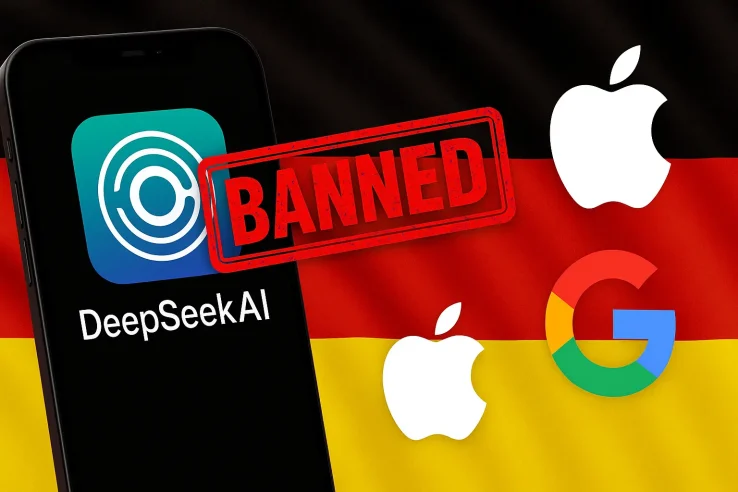In a bold move that signals growing unease over artificial intelligence, Germany asks Google, Apple to remove DeepSeek AI from their app stores, citing data privacy concerns and potential national security risks. This decision comes amidst heightened scrutiny of AI technologies across Europe, as governments grapple with the balance between innovation and safeguarding citizens’ rights.
Germany’s Crackdown on DeepSeek AI: A Wake Up Call for the Tech World
The German Federal Office for Information Security (BSI) officially confirmed this week that it has urged Google and Apple to delist DeepSeek AI from their respective app stores. According to officials, the AI powered application, developed by a Chinese backed tech firm, poses “significant privacy risks” and raises fears about unauthorized data collection on German citizens.
This is not the first time Europe has taken a hard stance on AI related applications, but the fact that Germany asks Google, Apple to remove DeepSeek AI marks a clear escalation in the continent’s approach to foreign AI tools.
Why DeepSeek AI is Under Fire
DeepSeek AI, touted as an advanced conversational AI system capable of performing complex tasks, has rapidly gained popularity in recent months. With its seamless integration across devices, including mobile phones and desktops, it has been adopted by millions worldwide for tasks such as language translation, content creation, and even business communications.
However, German authorities believe this convenience comes at a dangerous cost. The BSI’s investigation highlighted several critical concerns:
Data Collection Risks: The AI allegedly collects vast amounts of user data, including conversations, device information, and potentially sensitive personal details, without transparent user consent.
Ties to Chinese Entities: DeepSeek AI’s parent company reportedly has links to organizations within China that are subject to state influence, raising alarms about data being funneled back to foreign servers beyond European regulatory oversight.
Lack of Compliance: Despite repeated inquiries, the company behind DeepSeek AI has failed to meet the European Union’s stringent data protection standards under GDPR (General Data Protection Regulation).
Given these findings, it comes as little surprise that Germany asks Google, Apple to remove DeepSeek AI in what many see as a proactive defense of European digital sovereignty.

Broader Implications for AI Regulation in Europe
Germany’s move is part of a broader European trend to tighten regulations on artificial intelligence. The EU’s landmark AI Act, set to come into effect in stages starting in 2025, aims to establish strict guidelines for AI development, deployment, and usage within member states.
The AI Act introduces a risk-based classification system for AI applications, with the most critical systems such as biometric surveillance or applications linked to national security subject to the highest level of scrutiny.
In this climate, the fact that Germany asks Google, Apple to remove DeepSeek AI is seen as an early test case for how these new rules may be enforced. It also sends a clear message to tech companies worldwide. Europe will not tolerate AI products that compromise privacy or national interests.
Tech Giants Under Pressure: Google and Apple’s Response
Both Google and Apple have acknowledged receiving the request from German authorities. While neither company has confirmed immediate removal of DeepSeek AI from their platforms, insiders suggest that discussions are ongoing, and both companies are carefully reviewing the matter.
For Google and Apple, the situation presents a delicate balancing act. On one hand, complying with national regulations is essential to maintaining access to the European market. On the other hand, removing a widely used AI tool like DeepSeek AI could provoke backlash from users and developers, especially if conclusive evidence of wrongdoing remains limited to government reports.
Nonetheless, history shows that when powerful European regulators step in, tech giants often fall in line. The world watched similar scenarios unfold with privacy lawsuits, GDPR enforcement, and content moderation policies in the past.
What This Means for AI Users and the Future
For ordinary users, the news that Germany asks Google, Apple to remove DeepSeek AI is both a cautionary tale and a reminder of the complex digital landscape we now inhabit. While AI tools promise convenience and productivity, they also open doors to potential abuse especially when data flows across borders unchecked.
Experts believe this case highlights the growing need for:
Stricter AI Transparency: Users deserve to know exactly how their data is used, where it is stored, and who has access.
Enhanced Regulatory Cooperation: Countries must collaborate to create global AI standards that protect citizens while fostering innovation.
Consumer Vigilance: Until clear regulations are universally applied, users must remain cautious about which AI apps they trust with their data.
As AI continues to reshape society, the decisions made today like the one where Germany asks Google, Apple to remove DeepSeek AI will define the ethical and legal boundaries of this technology for years to come.
Germany’s latest move is not just about one app; it represents a growing global debate about privacy, security, and AI ethics. Whether other countries follow Germany’s lead remains to be seen, but one thing is clear: the era of unregulated AI is rapidly coming to an end.
